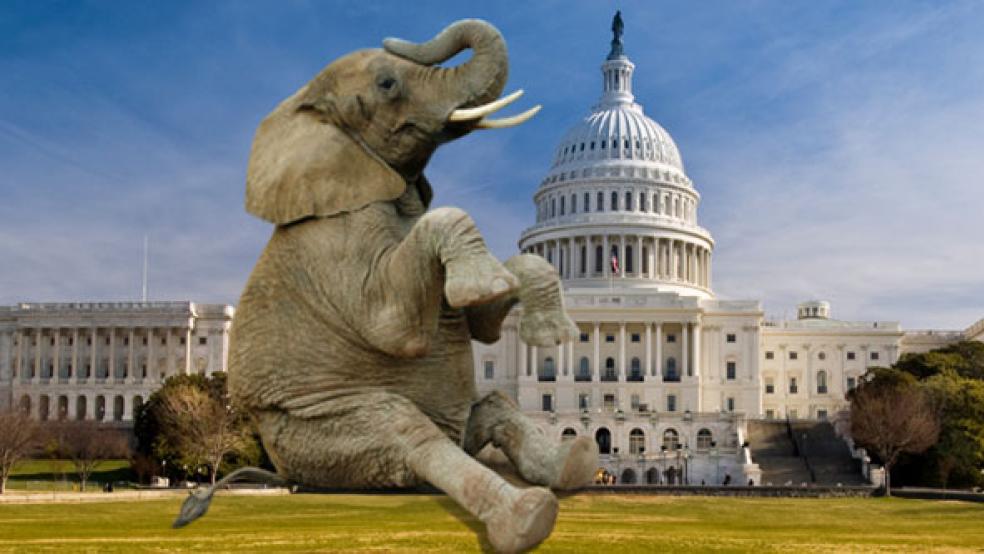Four months after suffering a bruising loss in the presidential campaign, Republican lawmakers and conservative activists will meet Thursday for a three-day conclave which will lay bare the many contradictions of a party in search of its identity.

The Conservative Political Action Conference (CPAC), organized by the 49-year-old advocacy group American Conservative Union, convenes in Washington as a showcase for the Republican Party's future and an opportunity to air grievances about the party's past.
Two reminders of failed presidential campaigns will be on hand as former Massachusetts Governor Mitt Romney, the 2012 Republican nominee, and former Alaskan Governor Sarah Palin, the 2008 vice presidential nominee who ran beside presidential nominee John McCain, will address 8,000 conservatives.
RELATED: Why Newt Gingrich Could Be the GOP's Mr. Fix It
Around those past candidates, potential future presidential contenders will jockey for the audience's attention in what has become an annual cattle call for rising Republican leaders. While leading Republican governors and congressmen will offer short speeches challenging President Barack Obama and offering their own visions for the Republican Party, in the wings, party rank-and-file will debate topics that were once well outside the conservative mainstream.
SHOOT THE CONSULTANTS?
Three Republican congressmen will participate in a panel called, "Too Many American Wars?" In the Senate last week, a row over the use of drones among Republican Senators Rand Paul, John McCain and Lindsey Graham gave an airing to disagreements in the party over the proper scale and nature of the U.S. military.
Frustration over how the party managed the 2012 campaign will receive a hearing in a discussion entitled, "Should We Shoot All the Consultants Now?" One consultant on the panel, Jeff Roe, a strategist from Missouri, said his answer will be no, they should not all be shot.
Elsewhere, strategists will debate what kind of candidates the party should field. Since the election some like Karl Rove, a former top adviser to President George W. Bush, have knocked heads with Tea Party leaders over the quality of certain potential Republican candidates.
RELATED: Tea Party Says As Debt Rises, So Does Membership
"There's probably more freedom of thought in some of these areas than we had two decades ago," said Al Cardenas, chairman of the American Conservative Union.
Recent polling suggests the Republican Party has a long climb ahead of it to return to favor with American voters. In a Pew Research Center survey of 1,504 adults released February 26, 62 percent of respondents said the Republican Party was out of touch with the American people; 46 percent said that of Democrats. Fifty-two percent said Republicans are too extreme; 39 percent said the same of Democrats.
On Monday, the Republican National Committee will release a report of its own detailing how it plans to change after the election. Recently, party chairman Reince Priebus has appeared before urban and African-American audiences, arguing that the party's message is one that should appeal to all groups.
RELATED: 5 Who Could Lead the Republican Party in 2013
Party leaders are in the throes of a debate over whether their ideas need to change to appeal to a wider swathe of the electorate. Those who argue for a new focus say they see hope in lawmakers who are working for immigration reform in Congress. "When you've lost the popular vote in five of the last six presidential elections, it's a mirage to believe that the message is great and it's just been communicated ineffectively," said Republican pollster Whit Ayres.
In an interview, Cardenas said the party needs to offer a bolder brand of conservatism. At the same time, he wants to emphasize the openness of the movement. The number of African-American and Hispanic speakers this year will be greater than any previous year, he said.
Meanwhile, the Tea Party Patriots will host a panel at CPAC called, "Trump the Race Card: Are You Sick and Tired of Being Called a Racist and You Know You're Not One?"
WHO'S MISSING?
The spirits of CPAC and the Republican Party have not always been in sync. Past winners of the traditional presidential straw poll have included former Congressman Ron Paul and evangelical leader Gary Bauer, suggesting that attendees are not always in lock step with the thinking of the party's mainstream. Still, the conference's agenda is read as a tip sheet for who's up and who's down in a party that is plotting a comeback.
There has been a kerfuffle over who hasn't been invited to the affair, including New Jersey Governor Chris Christie, a Republican governor in a blue state who holds one of the highest approval ratings in the country but has crossed party orthodoxy on gun control among other issues.
"I think if there had been a vote taken, it would have been a very different situation," said one American Conservative Union board member about the Christie snub. Virginia Governor Bob McDonnell will also be missing, despite having attended the conclave for the last two years. He ruffled Republicans' feathers by recently signing a transportation bill which included a tax hike.
Even the amount of time granted to speakers has been getting a once-over, with conservative magazine National Review reporting that television personality Donald Trump has been granted twice the speaking time as Rick Santorum, who won three million votes in the 2012 Republican presidential primary.
Cardenas downplayed the complaints. "Maybe there's an epidemic in the movement," he said. "It's almost like we need to contact the Center for Disease Control and say a whiner's epidemic has broken out."




